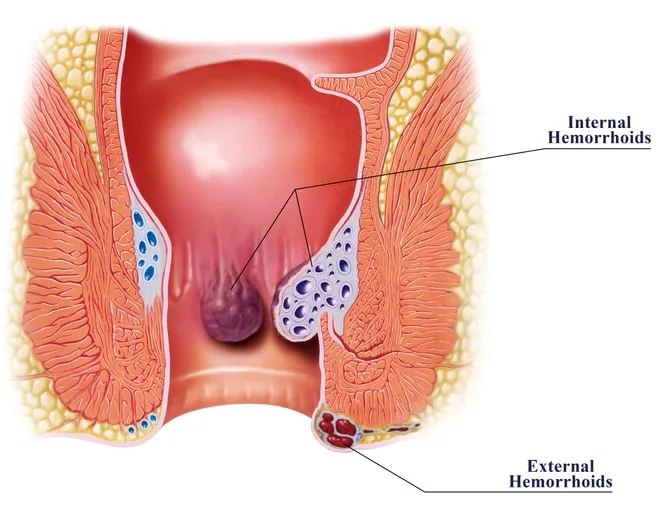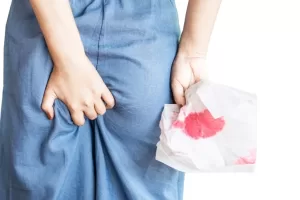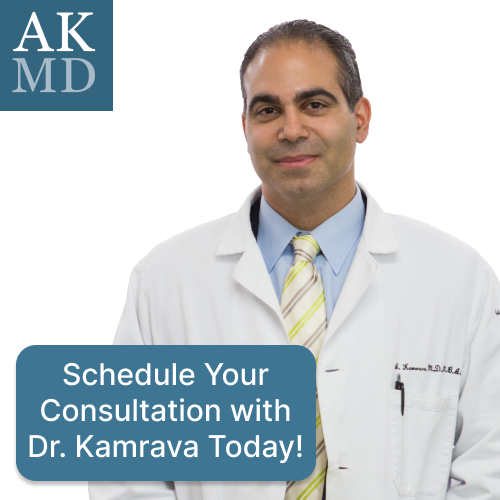We’d rather avoid talking about hemorrhoids, often known as piles since they’re so annoying. However, they’re one of the most frequent health issues. Hemorrhoids affect almost three-quarters of all people at some point, but how can you get rid of them?
Despite the fact that hemorrhoids seem to be a touchy issue, they are nothing to be ashamed of. More than 3 million individuals in the United States suffer from hemorrhoids each year or around 50 percent of the population over age 50. Hemorrhoids are common, but effective treatment is necessary to avoid problems or extreme discomfort, which may be caused by hemorrhoids. Know the best way to get rid of hemorrhoids. Keep reading.
Hemorrhoids: What are They And How Can You Get Rid of Them?
Anus or lower rectum hemorrhoids are caused by swollen and irritated veins. Some people call them “piles.” Hemorrhoids are classified as either external or internal, with the former being the more common. When it comes to hemorrhoids, there are many different types, each with its own set of symptoms.
External hemorrhoids may cause the following symptoms:
- Itching in the anus region
- Swollen, painful bumps on the anus
- Discomfort in the anus region, particularly while seated
You’ll know how to get rid of external hemorrhoids in this article further.
An internal hemorrhage’s symptoms are as follows:
- Colonic hemorrhage
- Bulges outside the anus
What Is a Hemorrhoid?
Hemorrhoids are common, but do you know what they are? Blood vessel clusters called hemorrhoids develop in the lower rectum and anus. Finally, the large intestine emerges via the anus into the rectum. Feces exit the body via the anus, the last part of the digestive system. When the veins grow and their walls become strained, thin, and irritated by the passage of feces, hemorrhoids may swell. There are two main types of hemorrhoids, which are:
- Starting from inside the rectum
- Extrinsic, with origins in the antrum.
There has been discomfort and irritation caused by hemorrhoids (also known as piles) throughout human history. A vein that is prone to hemorrhage is known as a “hemorrhoid” in Greek. You’re not the only one who has experienced hemorrhoid discomfort. There’s a good chance you’ll suffer from hemorrhoids at some time in your life. Hemorrhoids were a problem for even Napoleon, who was distracted by intense agony during his loss at Waterloo.
Diagnosis of Hemorrhoids
- Know the signals: In order to determine whether or not you have hemorrhoids, you need to be aware of the signs and symptoms. Internal and external hemorrhoids might present with the following symptoms. Symptoms of internal hemorrhoids include vivid crimson rectal bleeding during bowel movements. Bright crimson blood will be visible as you clean yourself. They seldom cause any discomfort. Anal itchiness and burning may be caused by external hemorrhoids, which are external. It is common for them to hurt and bleed while wiping up after a bowel movement. It might be difficult to sit for long periods of time if you have external hemorrhoids.
- Be aware of other symptoms too: Other severe health disorders, such as anal or colon cancer; diverticulitis; or bacterial infection may cause rectal bleeding. Hemorrhoids, on the other hand, are typically not life-threatening. If you see any new rectal bleeding, don’t hesitate to contact your doctor for an evaluation and treatment.
- Know hemorrhoids: Blood vessels in the anal or rectal region might become enlarged and irritated due to hemorrhoids. Increased pressure in the pelvic and anal regions is thought to be the culprit. There are several causes of hemorrhoids, including prolonged constipation and diarrhea. Pregnant women and those who are obese are also at risk of developing the disease. Hemorrhoids may form internally or externally as a result of anal intercourse.
It’s called an “internal hemorrhoid” since they’re found in the rectal area. Because of their proximity to the anus, if they’re big enough, they may expand during a bowel movement. It is common for the rectal aperture to get infected with external hemorrhoids. They might harden into a lump if they get inflamed and clot beneath the anal skin. This is referred to as a thrombosed hemorrhoid. If you are thinking do hemorrhoids go away, then take a look at some of the effective remedies below.
Also see Understanding Hemorrhoids: Expert Advice on How to Get Rid of Them
Hemorrhoid Remedies That Actually Work!
At home, you may take a number of actions to alleviate the pain produced by hemorrhoids:
- Sit in a sitz bath for 15 to 20 minutes, two to three times a day. Cover just your hips and buttocks in warm water. This may assist in reducing inflammation and itching. You can have a sitz bath in a few inches of water in a standard tub, but miniature tubs that fit over toilet seats are also sold for this purpose in pharmacies. Gentle patting with a clean towel can help prevent additional discomfort.
- Applying ice to the affected region might help reduce swelling and discomfort.
- While passing one’s bowels, don’t push yourself too hard or strain.
- Gentle patting with moistened pads, such as baby wipes, is a better method of cleaning your anus than wiping. Using rough, dry toilet paper, which may be scented, might exacerbate an already irritated bladder.
- By washing or bathing every day with warm water, you can keep the region clean. Gently pat the region dry after bathing. A hairdryer will work just as well for drying the region.
- In order to reduce the swelling of hemorrhoids and prevent the formation of new ones, it is best to sit on cushions rather than on hard surfaces like tables.
- Pain medications including acetaminophen, ibuprofen, and aspirin may be used over the counter (OTC).
Here you can check What is the Best Way to Get Rid of Hemorrhoids?
When, How, and Which Hemorrhoid Medication to Take
Hydrocortisone or witch hazel-based OTC lotions, ointments, and pads are readily accessible to alleviate the symptoms of hemorrhoids. The National Institute of Diabetes and Digestive and Kidney Diseases advises patients to try over-the-counter medications for a week before consulting with a physician. If your symptoms linger for more than a week, you should see your doctor right once to get rid of external hemorrhoids.
For this reason, you should not use hydrocortisone-containing creams or suppositories for more than a week at a time. Contact your healthcare practitioner if any of these lotions produce a rash or dry skin surrounding the region.
It is possible to avoid constipation by using fiber supplements like Metamucil (psyllium) or stool softeners like Citrucel (methylcellulose). Abstain from using laxatives, which may exacerbate diarrhea and the accompanying hemorrhoids.
Avoid Recurrence of Hemorrhoids
There are procedures that may be taken to prevent hemorrhoids from recurring after they have healed. Keeping a high-fiber diet and drinking enough of water are both treatment and preventative recommendations. Consider the following alternatives.
- Stay off the toilet for as little time as possible: Pressure is placed on the anal region when one spends a lengthy amount of time sitting on the toilet. Take no more than 10 minutes to relieve yourself in the bathroom. Take a stroll, drink water, and clean up if you are constipated. Then, try going again later.
- Make an effort to be more physically active: Constipation is made simpler by regular exercise, which increases bowel function. Walking is an excellent way to get started with cardiovascular exercise since it only takes 20 minutes a day. Aim to walk for at least five minutes per hour if your work requires you to sit. Additionally, exercising more may aid in weight reduction.
When to Go to The Doctor?
Hemorrhoids may be excruciatingly painful, but fortunately, most people get over their hemorrhoids within a week. After a week of self-care techniques, if you are still suffering symptoms of hemorrhoids or are experiencing significant pain or bleeding, you should seek emergency medical help. So if you think hemorrhoids go away, yes they do only if you take the right action at the right time.





